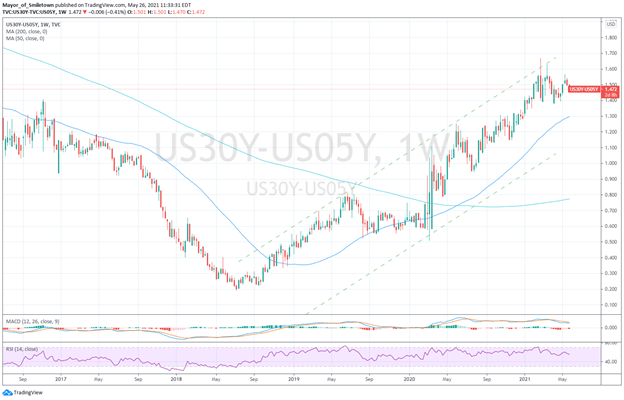MIDDAY MACRO - DAILY COLOR – 5/26/2021
PRICE MATRIX
OVERNIGHT/MORNING RECAP & MARKET WRAP
Narratives:
Equities are mixed after a quiet overnight led to the Russel rallying post-NY-open
Treasuries slightly higher again, with the long-end outperforming
WTI continues consolidating in yesterday’s range
Price Action:
Equities continue to chop sideways around key levels for a second day
Russell outperforming S&P/Nasdaq
Small-Cap, Momentum, and Value factors outperforming
Consumer Discretionary, Communication, and Real Estate sectors outperforming
Call Wall fell to 4210, and 4160 is where gamma would flip negative, technical support is at 4180, and resistance is 4220
Major Asian indexes are higher: Japan +0.3%. Hong Kong +0.7%. China +0.3%. India +0.8%
European bourses are flat, at midday: London -0.2%. Paris +0.1%. Frankfurt -0.2%
Treasuries higher with the curve again bull flattening
5yr = 0.77%,10yr = 1.55%, 30yr = 2.24%
Month-end buying by pensions is expected to continue the long end's outperformance
WTI lower by -0.5% to $65.80
Prices are still up by about 4% this week as markets are increasingly upbeat about the demand outlook.
Copper higher by 0.6% to $4.54
China’s commodity exchanges raised margin requirements and hiked transaction fees this week. They also said overnight that they would "vigorously investigate abnormal transactions" and curb unreasonable price swings. This has hit ferrous markets hard while copper has held up.
Aggs weaker overnight and at NY-open but now attempting to recover
China to limit corn imports and cancel several U.S. cargoes
DXY slightly higher to 89.8, but off AM highs
Gold higher by 0.3% to $1905
Bitcoin higher by 5% to $39.3K as the wild ride continues
Econ Data:
Richmond Fed Manufacturing Index: The composite index inched up from 17 in April to 18 in May, as all three component indexes (shipments, new orders, and employment) reflected growth. Overall, manufacturers reported improved business conditions. However, the majority of firms reported lengthening vendor lead times, as this index reached a record high, along with the backlog of orders index. The average growth rates of both prices paid and prices received by survey participants rose in May, as the growth of prices paid continued to outpace that of prices received. Survey results indicated that many firms increased employment and wages in May. However, they struggled to find workers with the necessary skills, as this index dropped to its lowest value on record.
Analysis:
A bit of a “Groundhog Day” feel to the markets this week as every day seems to see Treasury yields methodically falling and equities melting higher.
Treasury curve’s bull flattening has been supported by pension fund buying of the long-end into month-end.
Equities have been supported by falling yields, lowering volatility, and allowing risk-parity and CTA strategies to increase exposure.
Absent a catalyst to move yields higher meaningfully (out of their recent range); we are in a feedback loop.
Does PCE tomorrow meaningfully change the inflation outlook to induce enough selling pressure to alter the current dynamic?
Unlikely, but certainly a risk to watch.
Federal Reserve Vice Chair Clarida’s comments yesterday were incrementally more hawkish again.
Hinted that if progress continues at the current pace, it may be appropriate to start a discussion about tapering QE in upcoming meetings.
We know this will be data-dependent, but we expect the next few months of data to more than warrant starting tapering talks.
Clarida’s overall framing was still dovish and consistent with patience.
Attacks from Senator Warren on Vice Chair Quarles during his Congressional testimony yesterday highlight the personnel and cultural changes that are coming to the Fed under the Biden Administration.
Progressives will favor continued tighter regulations on banks that limit risk-taking while promoting more equitable access to banking by lower-income and minority communities.
This will effectively increase the credit risk exposure banks take while reducing market and counterparty risk in the long run.
Biden will want a woman or minority, keeping in line with the personnel diversity priorities he has pushed throughout the rest of his cabinet selections.
This selection criterion favors Mary Daly of SF, Raphael Bostic of Atlanta, and less likely Lael Brainard from the Board as possible Chairman Powell replacements.
The “mission creep” risk the Fed now faces is a genuine threat to the stability of the dollar and U.S. financial system (in the long run) and will be an ongoing theme to watch closely.
TECHNICALS / CHARTS
Four Key Macro House Charts:
Growth/Value Ratio: Growth Outperforming on the Week
Chinese Iron Ore Future Price: Iron Ore Lower on the Week
5yr-30yr Treasury Spread: Curve is Flatter on the Week
EUR/JPY FX Cross: Euro Higher on the Week
HOUSE THEMES / ARTICLES
Digital Infrastructure Security and the “5th Dimension”
French media and social networks were abuzz on Tuesday with speculation about a mysterious offer to influencers and YouTube personalities asking them to publicly denigrate the Pfizer/BioNTech Covid-19 vaccine in return for money. Those targeted by the campaign, who are active in the health and science fields, said they had received an email from an apparently UK-based communications agency offering them “a partnership” on behalf of a client with “a colossal budget” but who wanted to remain anonymous and also to keep any deal secret.
The profiles found by one influencer after investigating the offer have now disappeared, but not before he noticed that “everybody there has worked in Russia”. The authors of the emails, claiming to be a London-based agency called Fazze, are difficult to trace, French media reported. Le Monde newspaper said Fazze had never been registered in the United Kingdom but may have a legal presence in the Virgin Islands. But according to the LinkedIn profile of Fazze’s CEO, now deleted, the agency operates out of Moscow, Le Monde said.
Information Access: Activists Mobilize to Fight Censorship and Save Open Science – EFF
More than half of academic publishing is controlled by only five publishers. Sci-Hub is a part of a movement towards pushing back on these publishers' growing power to charge for access to scientific content. Since its inception, Sci-Hub has faced numerous legal challenges and investigations. Some of these challenges have led to dangerously broad court orders restricting the exchange of scientific findings.
The past year has shown the incredible power of open access to scientific findings after publishers made COVID-19 research immediately available at no cost. This temporary move towards open access helped support the unprecedented global public health effort that spurred the rapid development of vaccines, treatments, and better-informed public health policies. It’s important to watch Sci-Hub’s struggle to understand where the battle for the free exchange of scientific findings goes.
AI Profiling: Heated List – The Verge
Article about how an algorithm built by the Chicago Police Department predicted a person based on his proximity to and relationships with known shooters and shooting casualties would be involved in a shooting. The person was identified as both a potential victim and a potential perpetrator, and the police, social worker, and neighborhood watch treated him as such.
This story reads like something out of the movie Minority Report, with various forms of “predictive policing” becoming standard practice across the country. The article describes how once put on this “Heat” list by the AI model, the person identified was more closely scrutinized by the police, eventually arresting him for a non-shooting-related minor offense and he was later a victim of two shootings. The model itself uses race, geo-location, and other data points to create a prediction in a “black box” way, causing concern by civil rights advocates that it is highly biased. These accusations of AI biases are not far from recent Fed speakers questioning the fairness of how individuals receive credit scores from financial models.
Commodity Super Cycle:
Agg Profits: Cargill Heads to Record Profit on Booming Agriculture Market - BBG.
Cargill made almost $4.3 billion in net income during the first nine months of its fiscal year, according to data released by the trading house to tap the bond market. That figure already surpasses its best-ever total annual profit. The rating agencies pointed to two big factors behind the profit boom: strong beef processing margins and unprecedented corn demand in China.
The strong results at Cargill echo a trend across the commodity trading industry, which has profited handsomely from volatile markets over the last year. For example, Vitol Group, the world’s largest independent oil trader, saw record earnings in calendar 2020, while Trafigura Group, the second-largest independent oil and metals trader, also reported unprecedented profits in its financial year to September 2020.
Energy and Resource Transition
Wind: Biden Administration Strikes Deal To Bring Offshore Wind To California - NPR
The Biden administration plans to open the California coast to offshore wind development, ending a long-running stalemate with the Department of Defense that has been the biggest barrier to building wind power along the Pacific Coast.
The agreement identifies two sites off Central and Northern California with the potential to install massive floating wind turbines that could produce 4.6 gigawatts of electricity, enough to power 1.6 million homes. A potential lease auction for the offshore wind sites could be held in mid-2022. But the projects will still have to negotiate concerns about the potential impacts on California's fishing industry and shipping channels, as well as any environmental concerns about sensitive ecosystems.
ESG Monetary Policy
Quarles: Biden Urged to Replace Quarles; Clarida’s Not Talked Fed Future - BBG.
With only months left on their current terms, Federal Reserve vice-chairs Randal Quarles and Richard Clarida time in office may be drawing short. The rollback of some banking rules by the Fed under Powell and Quarles has drawn withering criticism from Democrats, even as they applaud the central bank’s ultra-easy monetary policy to support the post-pandemic economic recovery.
Depending on how it’s handled, the removal of more traditional central bankers like Quarles and Clarida could inject uncertainty over who will eventually be chairman. Any more left-leaning appointments to either of the vice-chair positions would increase speculation that the Powell may be replaced by a Bostic or Daly and that the Fed’s mission creep would only expand.
Commodity Cycle
Discipline: Commodity Prices Have Soared, but Miners Aren’t Investing - WSJ.
Despite a commodity boom that is boosting profits, miners aren’t throwing cash at new projects, raising concerns about future shortages of some metals. So-called technology metals, such as cobalt, copper, and lithium, are set for large deficits. Capital spending is set to fall by 6% among major diversified mining companies and 10% among copper miners this year, according to analysts’ consensus.
Miners are returning more money to investors, analysts and executives say, after overspending on projects and acquisitions during that last run, which lasted for a decade. Investors then deserted the sector, some miners went bankrupt, and many chief executives lost their jobs. While analysts expect miners to start investing more in new projects if commodity prices remain elevated, mines typically take 10 to 15 years to develop.
Big Tech Regulation/Taxation
Antitrust: Amazon Policy Punishes Consumers, DC Suit Claims – WSJ.
The lawsuit targets contracts between Amazon and its sellers which prevent the sellers from offering lower prices on any other website, including their own. The lawsuit cites violations of Washington, DC, law rather than federal law, limiting the case’s ultimate impact.
Although Amazon’s “Fair Pricing Policy” is presented as protection for consumers, it will be reviewed as a further way Amazon is increasing its market share and stifling competition. The Federal Trade Commission and other US states have also been probing some of Amazon’s other business practices. In November 2020, the European Union accused the company of violating antitrust laws by unfairly competing against third-party sellers.
China Macroprudential Policy
Commodity Markets: China bars banks from selling commodities-linked products to retail buyers - Reuters
CBIRC's is expected to order selling to stop in commodity-linked retail products and unwind existing positions on their books (which has not occurred before), and the directive is not yet public. The move comes as runaway commodity prices in both onshore and offshore markets have raised regulatory concerns about the risks of speculative bets, prompting China's state planner and exchanges in recent weeks to take price-control measures.
The CBIRC wants to prevent losses like that incurred a year ago by the Bank of China on crude-oil-linked investment products. While the total size of such products in the Chinese banking system is unknown, BoC's $1.8 billion losses tied to just US crude futures highlight the attractiveness of similar products for retail investors looking for higher returns.
Unipolar to Multipolar World
UAE Weapon Sales: F-35 Sale to UAE Imperiled Over U.S. Concerns About Ties to China – WSJ
Recent Chinese transport flights, along with other signs of nascent security cooperation between Beijing and the U.A.E., a major U.S. ally in the Gulf region, have alarmed U.S. officials and cast fresh uncertainty over a multibillion-dollar sale of advanced U.S. weapons to the Emirates, the officials said.
A 2020 Pentagon report on China’s military ambitions said that the U.A.E. was among the nations China was “very likely already considering and planning for additional overseas military logistics facilities.” Some defense officials say they believe China hopes to build a navy base in the Emirates, and intelligence reports indicate that Beijing has discussed sending several hundred military personnel to the U.A.E.
Northern Triangle: The Northern Triangle is Ready for a Digital Trade Agreement With the United States – Global Trading Mag
The United States already has a free trade agreement with Central America, but it was enacted long before digital chapters became routine in U.S. trade agreements. Concluding a freestanding agreement on digital trade is a practical and efficient way to add significant value to the free trade agreement already in force with El Salvador, Guatemala, and Honduras.
A digital trade agreement would also complement the technical assistance provided by organizations including the Inter-American Development Bank, the U.S. Agency for International Development, and the U.S. International Development Finance Corporation that is focused on building the infrastructure needed to digitize Northern Triangle economies and fight crime, corruption while supporting the modernization of their economies. Given the current focus on the “border crisis” and China’s growing soft power in Central and South America, any policies by the Biden administration to promote economic growth and trade with southern neighbors are worth watching.
Carrot and Stick: China Disappeared H&M From Its Internet, Splitting Fashion Industry Group - WSJ
The Better Cotton Initiative, a collaboration among big brands, environmental groups, farmers, and human rights organizations, has for years worked to bolster the global apparel industry’s access to sustainably produced cotton. But the Chinese government’s recent attacks on the group and one of its leading members, fast-fashion giant H&M, have raised concerns about whether BCI’s fashion brands can continue selling clothes in China if the group challenges Beijing again.
Following the online blocking of H&M and Chinese social-media users calling for boycotts of members Nike and Adidas AG , BCI deleted from its website a months-old statement about concerns that cotton was being produced by forced labor in Xinjiang. BCI hasn’t publicly addressed the situation, saying a response could threaten the personal safety of its dozen or so staffers in China, the people close to the organization said. While BCI has backtracked on its public statements, it has maintained its position on halting the training and licensing of farmers in Xinjiang.
Thank you for reading - Mike


















